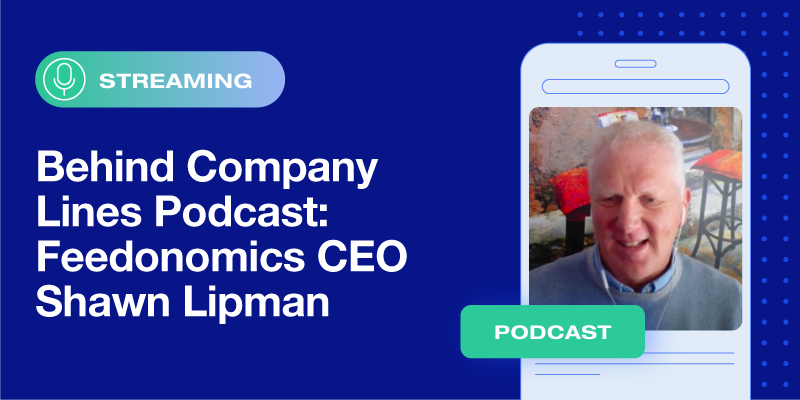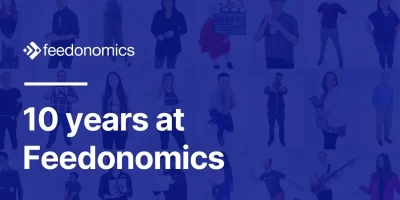Feedonomics CEO Shawn Lipman recently appeared on the Behind Company Lines podcast to discuss a wide range of topics, such as the early days of Feedonomics, how rugby shaped his views on company culture, what makes Feedonomics a leader in the feed management space, and how its industry-transforming software has applications beyond ecommerce.
You can read about key parts of the conversation below.
Establishing a strong cultural foundation
“If you don’t do your job, not only can you get scored on, but you can actually get hurt at the same time,” Shawn said.
He’s talking about rugby, a sport he played professionally for decades. The game taught him many lessons in life, leadership, and business. He likens it to a puzzle, where each piece performs a necessary role and is needed to accomplish a greater shared goal.
“If all of the pieces of that puzzle aren’t executing, and functioning, and collaborating, and communicating, and battling together for the same common goal, you’re going to have fractures, and it’s those fractures which typically sink companies,” Shawn said.
After years in the sport where he was inducted into six sporting halls of fame and represented the US national team in more than 20 international matches—including the Rugby World Cup—Shawn realized that a strong cultural foundation was integral to winning teams.
As a result, he decided to incorporate the principles of the New Zealand All Blacks, the most successful rugby team of all time, into his business leadership style. The principles behind the team’s success are outlined in James Kerr’s book, “Legacy,” which laid the cultural foundations for Feedonomics.
Living the legacy
Shawn is adamant about doing more than plastering cultural platitudes on the wall of a break room. To him, culture makes or breaks an organization, and it is something that should be “embedded in the DNA of your organization.”
“If you’re not willing to double down and triple down on it, you will be found out,” Shawn said.
He thinks that a company’s culture isn’t tested in the easy times, but the challenging ones.
“That’s when your principles and your culture becomes the foundational glue that allows you to mobilize your people, to roll up their sleeves and be willing to take sacrifices with you. But you can’t ask your people to take sacrifices with you if you’re not willing to sacrifice yourself.”
He sees the employee-employer relationship as a two-way street. It’s up to the employer to create an environment where employees want to work for more than just a paycheck. He believes that every employee should have a higher purpose, that each employee has something to share, that a learning environment is critical, and that a questioning environment propels innovation.
Providing your team with the right tools, support, and respect models the correct behavior for the employee-customer relationship. He believes that companies with poor service, poor responsiveness, and poor engagement with their customers are guaranteed to have those same problems within their organizations.
Building a better mousetrap
Shawn detailed the origins of Feedonomics, which stemmed from challenges he and cofounders Robert Roizen, Brian Roizen, and Gary Putterman faced when they ran a performance marketing company together.
Their clients wanted to advertise and sell products on the top shopping channels like Google Shopping, Amazon, eBay, and Facebook, but the listing process became unwieldy when brands had catalogs with thousands or millions of products.
They searched for a solution to solve their problem, but couldn’t find anything that could do the job. So, the Roizens decided to create the necessary software themselves.
“We built it, we looked at it, and we said, ‘This is better than anything in the world. Literally,’” Shawn said. “The UI wasn’t particularly pretty, but the underlying functionality of it was game changing.”
With the power of this new technology and their shared understanding of advertising and marketplace channels, Feedonomics was born. The software that was built to solve their own problems could now help thousands of businesses overcome similar hurdles.
Providing the critical infrastructure for ecommerce and beyond
“We’re building the plumbing—the piping—for ecommerce,” Shawn said.
In the same way enterprising merchants supplied shovels and wheelbarrows to eager prospectors during the gold rush, Feedonomics provides the software and services merchants need to sell products on hundreds of shopping channels, so they can strike gold of their own.
“It’s the most advanced, scalable, powerful, technology in the world for essentially connecting systems,” Shawn said.
Feedonomics’ ability to connect disparate systems with vast amounts of data creates opportunities to solve challenges outside of just ecommerce.
Meeting modern marketplace demands
When asked about the mechanics of connecting the right customers to a merchant’s product when there is so much competition and so many channels to choose from, Shawn shed light on a fundamental topic.
“Relevance,” he said. “And that’s where the complexity of it comes.”
Shawn explains that channels driven by search, like Google, depend on and reward relevant product ads. Other channels, like Facebook, use your profile, activity, and other indicators to display relevant ads to you.
“In either one, categorization and optimization of what you’re sending to them is critical,” Shawn said.
Feedonomics uses FeedAi to automatically categorize products according to Google’s taxonomy, and it’s fine-tuned to sort large product catalogs without making common mistakes.
For example, when a seller has a product titled “dress shirt,” FeedAi is able to determine that the product should be categorized as a shirt, not a dress. So when someone does a Google search for a dress shirt and finds exactly what they searched for, channels like Google reward advertisers with a lower cost-per-click than they would have with a less relevant product.
“The chances of that product actually being provisioned to someone who actually wants to buy it becomes enhanced.” Shawn said. “And that’s where the power of what we do really comes to the forefront.”
Since Feedonomics started more than eight years ago, the ecommerce industry has gone through drastic changes. Feedonomics has remained agile, providing software and solutions that fulfill the modern demands of clients and the marketplace as a whole.
Feedonomics optimizes product listings according to each shopping destination’s best practices, sends optimized feeds to hundreds of global channels, and syncs orders, inventory, and product data across multiple systems.
The company, which started as a team of four, now has more than 400 team members and serves 2500 clients in 80 countries around the globe—a testament to the teams and technology that power the company, the foundation it was built on, and the culture that binds it.

With its leading data feed management platform, Feedonomics helps brands, retailers, and agencies optimize and list products on hundreds of shopping destinations around the world. Learn more about our full-service solutions for advertising channels and marketplaces.

